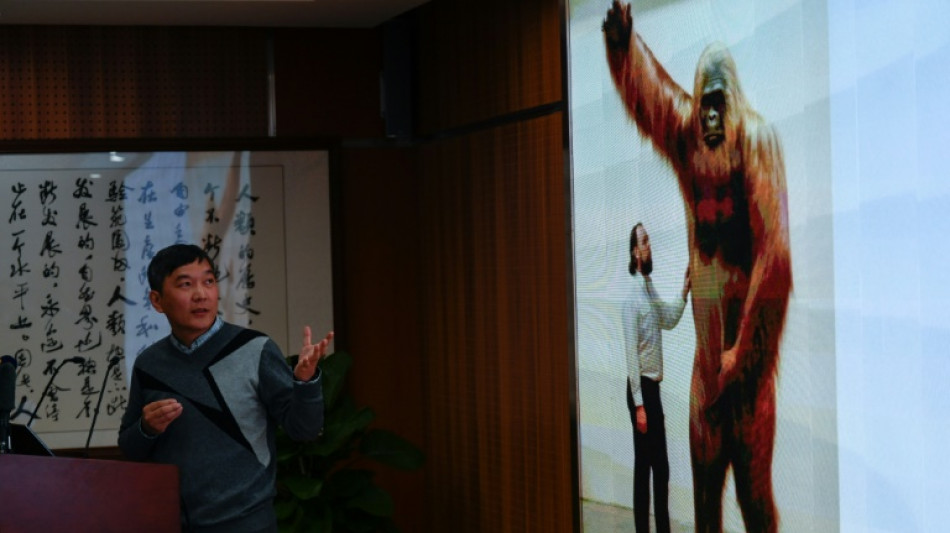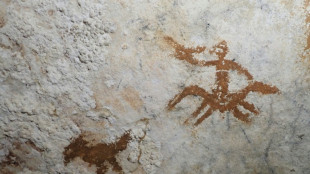
-
 Trump rules out 'force' against Greenland but demands talks
Trump rules out 'force' against Greenland but demands talks
-
Stocks steadier as Trump rules out force to take Greenland

-
 World's oldest cave art discovered in Indonesia
World's oldest cave art discovered in Indonesia
-
US hip-hop label Def Jam launches China division in Chengdu

-
 Dispersed Winter Olympics sites 'have added complexity': Coventry
Dispersed Winter Olympics sites 'have added complexity': Coventry
-
Man City players to refund fans after Bodo/Glimt debacle

-
 France's Lactalis recalls baby formula over toxin
France's Lactalis recalls baby formula over toxin
-
Pakistan rescuers scour blaze site for dozens missing

-
 Keenan return to Irish squad boosts Farrell ahead of 6 Nations
Keenan return to Irish squad boosts Farrell ahead of 6 Nations
-
US Treasury chief accuses Fed chair of 'politicising' central bank

-
 Trump rules out force against Greenland but demands 'immediate' talks
Trump rules out force against Greenland but demands 'immediate' talks
-
Israeli strike kills three Gaza journalists including AFP freelancer

-
 US Congress targets Clintons in Epstein contempt fight
US Congress targets Clintons in Epstein contempt fight
-
Huge lines, laughs and gasps as Trump addresses Davos elites

-
 Trump at Davos demands 'immediate' Greenland talks but rules out force
Trump at Davos demands 'immediate' Greenland talks but rules out force
-
Australia pauses for victims of Bondi Beach shooting

-
 Prince Harry says tabloid coverage felt like 'full blown stalking'
Prince Harry says tabloid coverage felt like 'full blown stalking'
-
Galthie drops experienced trio for France's Six Nations opener

-
 Over 1,400 Indonesians leave Cambodian scam groups in five days: embassy
Over 1,400 Indonesians leave Cambodian scam groups in five days: embassy
-
ICC rejects Bangladesh's plea to play T20 World Cup matches outside India

-
 Prince Harry says UK tabloid court battle in 'public's interest'
Prince Harry says UK tabloid court battle in 'public's interest'
-
Trump lands in Davos to push Greenland claims

-
 Balkan wild rivers in steady decline: study
Balkan wild rivers in steady decline: study
-
Injured Capuozzo misses out on Italy Six Nations squad

-
 Mourners pay last respects to Italian icon Valentino
Mourners pay last respects to Italian icon Valentino
-
EU parliament refers Mercosur trade deal to bloc's top court

-
 Odermatt seeks first Kitzbuehel victory with eye on Olympics
Odermatt seeks first Kitzbuehel victory with eye on Olympics
-
Italy's Brignone to be rested for Spindleruv Mlyn giant slalom

-
 Alcaraz spearheads big names into Australian Open third round
Alcaraz spearheads big names into Australian Open third round
-
European stocks dip ahead of Trump's Davos speech

-
 Trump flies into Davos maelstrom over Greenland
Trump flies into Davos maelstrom over Greenland
-
EU won't ask Big Tech to pay for telecoms overhaul

-
 Railway safety questioned as Spain reels from twin train disasters
Railway safety questioned as Spain reels from twin train disasters
-
Marcell Jacobs back with coach who led him to Olympic gold

-
 Syria army enters Al-Hol camp holding relatives of jihadists: AFP
Syria army enters Al-Hol camp holding relatives of jihadists: AFP
-
Brook apologises, admits nightclub fracas 'not the right thing to do'

-
 NATO chief says 'thoughtful diplomacy' only way to deal with Greenland crisis
NATO chief says 'thoughtful diplomacy' only way to deal with Greenland crisis
-
Widow of Iran's last shah says 'no turning back' after protests

-
 Waugh targets cricket's 'last great frontier' with European T20 venture
Waugh targets cricket's 'last great frontier' with European T20 venture
-
Burberry sales rise as China demand improves

-
 Botswana warns diamond oversupply to hit growth
Botswana warns diamond oversupply to hit growth
-
Spaniard condemns 'ignorant drunks' after Melbourne confrontation

-
 Philippines to end short-lived ban on Musk's Grok chatbot
Philippines to end short-lived ban on Musk's Grok chatbot
-
Police smash European synthetic drug ring in 'largest-ever' op

-
 Japan to restart world's biggest nuclear plant Wednesday
Japan to restart world's biggest nuclear plant Wednesday
-
South Korean ex-PM Han gets 23 years jail for martial law role

-
 Alcaraz, Sabalenka, Gauff surge into Australian Open third round
Alcaraz, Sabalenka, Gauff surge into Australian Open third round
-
Over 1,400 Indonesians left Cambodian scam groups in five days: embassy

-
 Raducanu to 're-evaluate' after flat Australian Open exit
Raducanu to 're-evaluate' after flat Australian Open exit
-
Doncic triple-double leads Lakers comeback over Nuggets, Rockets down Spurs


Late apes: Biggest primate ever died off due to 'huge mistake'
The largest primate ever to walk the Earth went extinct because it could not adapt to its changing environment, with the mighty beast reduced to living off bark and twigs before dying off, scientists said on Wednesday.
Gigantopithecus blacki, which stood three metres tall (10 feet) and weighed up to 300 kilogrammes (660 pounds), thrived in the forests of southern Asia until a little more than 200,000 years ago.
Exactly why the great ape died off after flourishing for hundreds of thousands of years has been one of the lasting mysteries of palaeontology ever since a German scientist first stumbled on one of its teeth at a Hong Kong apothecary in the 1930s.
The molar was so massive it was being sold as a "dragon's tooth".
"It was three to four times bigger than the teeth from any great ape," Renaud Joannes-Boyau, a researcher at Australia's Southern Cross University, told AFP.
"That intrigued him and that's where all this research started," said Joannes-Boyau, a co-author of a new study in the journal Nature.
All that has been found of the Gigantopithecus since are four partial jawbones and around 2,000 teeth, hundreds of which were discovered inside caves in southern China's Guangxi province.
Even after a decade of excavations in these caves, the cause of the ape's extinction remained elusive, said the study's co-lead author Yingqi Zhang of China's Institute of Vertebrate Palaeontology and Palaeoanthropology.
- Huge apes can't jump -
Seeking to establish a timeline of the animal's existence, the team of Chinese, Australian and US scientists collected fossilised teeth from 22 caves.
The team used six different techniques to determine the age of the fossils, including a relatively new method called luminescence dating which measures the last time minerals were exposed to sunlight.
The oldest teeth dated back more than two million years, while the most recent were from around 250,000 ago.
Now the researchers can tell "the complete story about Gigantopithecus's extinction" for the first time, Zhang told AFP in his office in Beijing.
They established that the animal's "extinction window" was between 215,000 and 295,000 years ago, significantly earlier than previously thought.
During this time, the seasons were becoming more pronounced, which was changing the local environment.
The thick, lush forest that Gigantopithecus had thrived in was starting to give way to more open forests and grassland.
This increasingly deprived the ape of its favourite food: fruit.
The huge animal was bound to the ground, unable swing into the trees for higher food.
Instead, it "relied on less nutritious fall-back food such as bark and twigs," said Kira Westaway, a geochronologist at Australia's Macquarie University and co-lead author.
Zhang said this was a "huge mistake" which ultimately led to the animal's extinction.
- Clever relative -
The primate's size made it difficult to go very far to search for food -- and its massive bulk meant that it needed plenty to eat.
Despite these challenges, "surprisingly G. blacki even increased in size during this time," Westaway said.
By analysing its teeth, the researchers were able to measure the increasing stress the ape was under as its numbers shrunk.
They also compared Gigantopithecus' fate to its orangutan relative, Pongo weidenreichi, which handled the changing environment far better.
The orangutan was smaller and more agile, able to move swiftly through the forest canopy to gather a variety of food such as leaves, flowers, nuts, seeds, and even insects and small mammals.
It became even smaller over time, thriving as its massive cousin Gigantopithecus starved.
Westaway emphasised that it was important to understand the fate of the species that came before us -- particularly "with the threat of a sixth mass extinction event looming over us".
L.Maurer--VB



